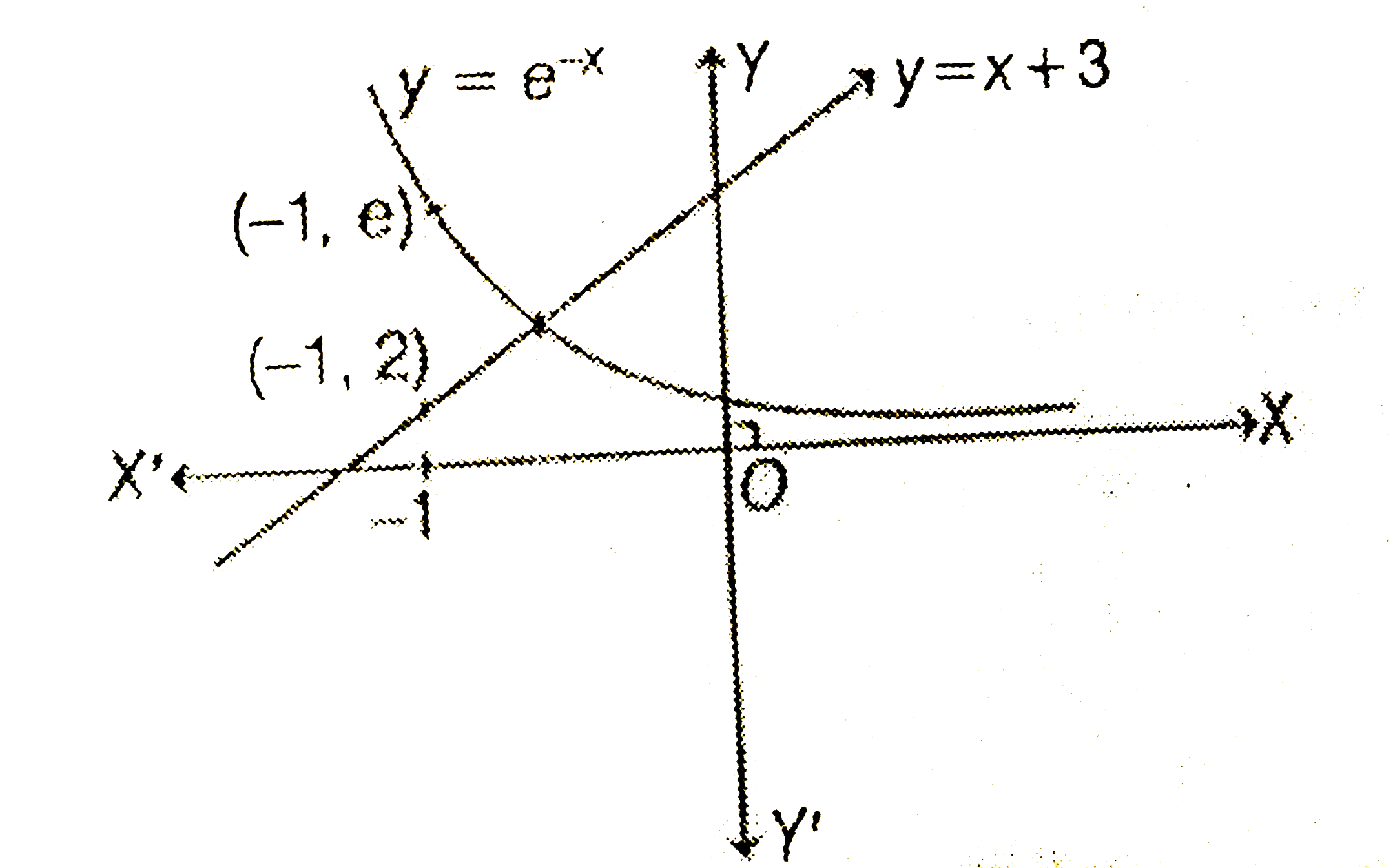Let y(x) be a solution of the differential equation (1+ex)y′+yex=1. If y(0)=2 , then which of the following statements is (are) true? (a) (b)(c)y((d)(e)−4(f))=0(g) (h) (b) (i)(j)y((k)(l)−2(m))=0(n) (o) (c) (d)(e)y((f)x(g))(h) (i) has a critical point in the interval (j)(k)((l)(m)−1,0(n))(o) (p) (q) (r)(s)y((t)x(u))(v) (w) has no critical point in the interval (x)(y)((z)(aa)−1,0(bb))(cc) (dd)
(a) Y(−4)=0
(b) Y(−2)=0
(c) y(x) has a critical point in the intervel (-1,0)
(d) y(x) has no critical point in the interval (-1,0)
The correct Answer is:(a,c)
Here, (1+ex)y'+yex=1
⇒dydx+ex⋅dydx+yex=1
⇒dy+exdy+yexdx=dx
⇒dy+d(exy)=dx
On integrating voth sides, we get
y+exy=x+C
Given, y(0)=2
⇒2+e0⋅2=0+C
⇒C=4
∴y(1+ex)=x+4
⇒y=x+41+ex
Now at x=−4,y=−4+41+e−4=0
∴y(−4)=0...(i)
For critical points, dydx=0
i.e. dydx=(1+ex)⋅1−(x+4)ex(1+ex)2=0
⇒ex(x+3)−1=0
or e−x=(x+3)
Clearly, the intersection point lies between (-1,0).
∴y(x) has a critical point in the interval (-1,0).

Topper's Solved these Questions
- DIFFERENTIAL EQUATIONS Book:IIT JEE PREVIOUS YEARChapter:DIFFERENTIAL EQUATIONS Exercise:TOPIC 1 SOLUTION OF DIFFERENTIAL EQUATIONS BY VARIABLE <br> SEPARATION METHOD <br> NUMERICAL VALUE
Explore 2 Videos
- DIFFERENTIAL EQUATIONS Book:IIT JEE PREVIOUS YEARChapter:DIFFERENTIAL EQUATIONS Exercise:TOPIC 1 SOLUTION OF DIFFERENTIAL EQUATIONS BY VARIABLE <br> SEPARATION METHOD <br>ANALYTICAL & DESCRIPTIVE QUESTIONS
Explore 2 Videos
- DIFFERENTIAL EQUATIONS Book:IIT JEE PREVIOUS YEARChapter:DIFFERENTIAL EQUATIONS Exercise:TOPIC 1 SOLUTION OF DIFFERENTIAL EQUATIONS BY VARIABLE <br> SEPARATION METHOD <br> OBJECTIVE QUESTIONS II (ONE OR MORE THAN ONE CORRECT OPTION)
Explore 1 Video
- DEFINITE INTEGRATIONBook:IIT JEE PREVIOUS YEARChapter:DEFINITE INTEGRATIONExercise:LIMITS AS THE SUM
Explore 6 Videos
- ELLIPSEBook:IIT JEE PREVIOUS YEARChapter:ELLIPSEExercise:EQUATION OF CHORD OF CONTACT, CHORD BISECTED AT A GIVEN POINT & DIAMETER
Explore 3 Videos
Similar Questions
Let y(x) be a solution of the differential equation (1+ex)y′+yex=1. If y(0)=2 , then which of the following statements is (are) true? (a)y(−4)=0 (b)y(−2)=0 (c)y(x) has a critical point in the interval (−1,0) (d)y(x) has no critical point in the interval(−1,0)
View SolutionLet y(x) be the solution of the differential equation2x2dy+(ey−2x)dx=0, x>0. If y(e) = 1, then y(1) is equal to :
View Solution
Knowledge Check
Let y(x) be a solution of the differential eqution (1+ex)y'+yex = 1. If y(0) =2, then which of the following statements is (are) true?
Ay(–4) = 0By(–2) = 0Cy(x) has a critical point in the interval (–1, 0)Dy(x) has no critical point in the interval (–1, 0)The solution of the differential equation x(e2y−1)dy+(x2−1)eydx=0 is
Aey+e−y=logx−x22+cBey−e−y=logx−x22+cCey+e−y=logx+x22+cDey−e−y=logx+x22+cLet y=f(x) is a solution of differential equation ey(dydx−1)=ex and f(0)=0 then f(1) is equal to
Aln2B2+ln2C1+ln2D3+ln2
Solution of the differential equation (1+exy)dx+exy(1−xy)dy=0 is
View SolutionLet y=f(x) be function satisfying the differential equation (y2x−y2)dx−xydy−0 and y(1)=e then the range of the function f(x) is:
View SolutionGeneral solution of differential equation:
(ey+1)cosxdx+eysinxdy=0 is:
View SolutionIf y=f(x) is the solution of differential equation , ey(dydx−2)=e3x such that f(0)=0 , then f(2) is equal to :
View SolutionIf y=e(α+1)x be solution of differential equation d2ydx2−4dydx+4y=0, then α is:
View Solution
